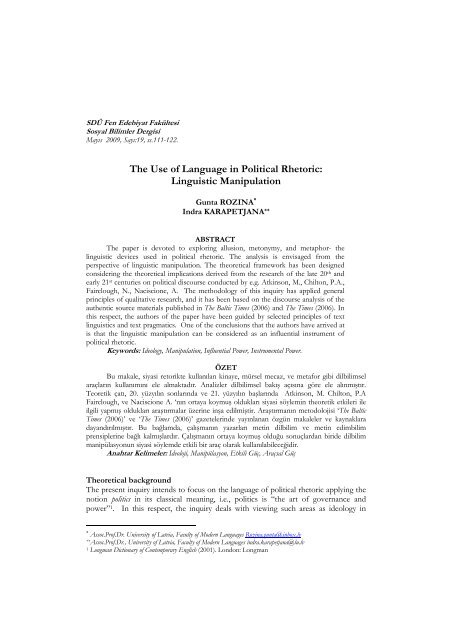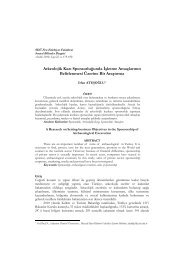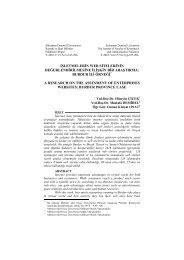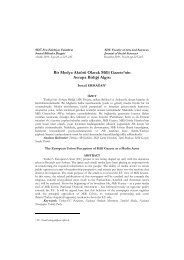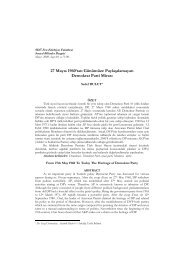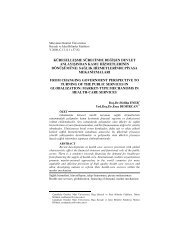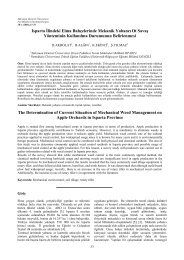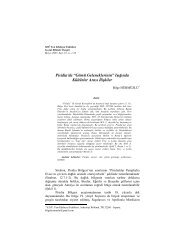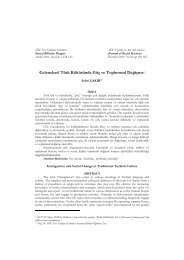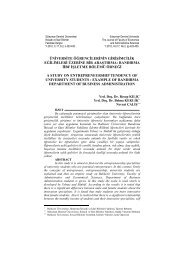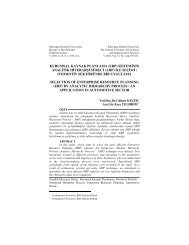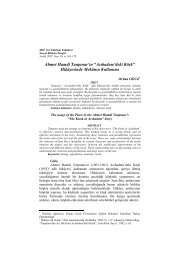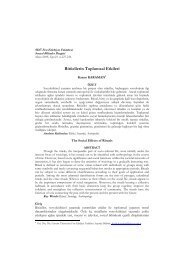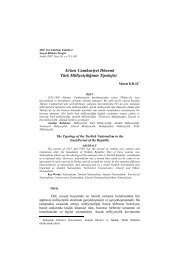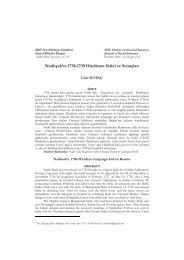The Use of Language in Political Rhetoric: Linguistic Manipulation
The Use of Language in Political Rhetoric: Linguistic Manipulation
The Use of Language in Political Rhetoric: Linguistic Manipulation
Create successful ePaper yourself
Turn your PDF publications into a flip-book with our unique Google optimized e-Paper software.
SDÜ Fen Edebiyat FakültesiSosyal Bilimler DergisiMayıs 2009, Sayı:19, ss.111-122.<strong>The</strong> <strong>Use</strong> <strong>of</strong> <strong>Language</strong> <strong>in</strong> <strong>Political</strong> <strong>Rhetoric</strong>:L<strong>in</strong>guistic <strong>Manipulation</strong>Gunta ROZINA ∗Indra KARAPETJANA **ABSTRACT<strong>The</strong> paper is devoted to explor<strong>in</strong>g allusion, metonymy, and metaphor- thel<strong>in</strong>guistic devices used <strong>in</strong> political rhetoric. <strong>The</strong> analysis is envisaged from theperspective <strong>of</strong> l<strong>in</strong>guistic manipulation. <strong>The</strong> theoretical framework has been designedconsider<strong>in</strong>g the theoretical implications derived from the research <strong>of</strong> the late 20 th andearly 21 st centuries on political discourse conducted by e.g. Atk<strong>in</strong>son, M., Chilton, P.A.,Fairclough, N., Naciscione, A. <strong>The</strong> methodology <strong>of</strong> this <strong>in</strong>quiry has applied generalpr<strong>in</strong>ciples <strong>of</strong> qualitative research, and it has been based on the discourse analysis <strong>of</strong> theauthentic source materials published <strong>in</strong> <strong>The</strong> Baltic Times (2006) and <strong>The</strong> Times (2006). Inthis respect, the authors <strong>of</strong> the paper have been guided by selected pr<strong>in</strong>ciples <strong>of</strong> textl<strong>in</strong>guistics and text pragmatics. One <strong>of</strong> the conclusions that the authors have arrived atis that the l<strong>in</strong>guistic manipulation can be considered as an <strong>in</strong>fluential <strong>in</strong>strument <strong>of</strong>political rhetoric.Keywords: Ideology, <strong>Manipulation</strong>, Influential Power, Instrumental Power.ÖZETBu makale, siyasi retorikte kullanılan k<strong>in</strong>aye, mürsel mecaz, ve metafor gibi dilbilimselaraçların kullanımını ele almaktadır. Analizler dilbilimsel bakış açısına göre ele alınmıştır.Teoretik çatı, 20. yüzyılın sonlarında ve 21. yüzyılın başlarında Atk<strong>in</strong>son, M. Chilton, P.AFairclough, ve Naciscione A. ‘nın ortaya koymuş oldukları siyasi söylem<strong>in</strong> theoretik etkileri ileilgili yapmış oldukları araştırmalar üzer<strong>in</strong>e <strong>in</strong>şa edilmiştir. Araştırmanın metodolojisi ‘<strong>The</strong> BalticTimes (2006)’ ve ‘<strong>The</strong> Times (2006)’ gazeteler<strong>in</strong>de yayınlanan özgün makaleler ve kaynaklaradayandırılmıştır. Bu bağlamda, çalışmanın yazarları met<strong>in</strong> dilbilim ve met<strong>in</strong> edimbilimprensipler<strong>in</strong>e bağlı kalmışlardır. Çalışmanın ortaya koymuş olduğu sonuçlardan biride dilbilimmanipülasyonun siyasi söylemde etkili bir araç olarak kullanılabileceğidir.Anahtar Kelimeler: Ideoloji, Manipülasyon, Etkili Güç, Araçsal Güç<strong>The</strong>oretical background<strong>The</strong> present <strong>in</strong>quiry <strong>in</strong>tends to focus on the language <strong>of</strong> political rhetoric apply<strong>in</strong>g thenotion politics <strong>in</strong> its classical mean<strong>in</strong>g, i.e., politics is “the art <strong>of</strong> governance andpower” 1 . In this respect, the <strong>in</strong>quiry deals with view<strong>in</strong>g such areas as ideology <strong>in</strong>∗ Assoc.Pr<strong>of</strong>.Dr. University <strong>of</strong> Latvia, Faculty <strong>of</strong> Modern <strong>Language</strong>s Roz<strong>in</strong>a.gunta@<strong>in</strong>box.lv**Assoc.Pr<strong>of</strong>.Dr., University <strong>of</strong> Latvia, Faculty <strong>of</strong> Modern <strong>Language</strong>s <strong>in</strong>dra.karapetjana@lu.lv1 Longman Dictionary <strong>of</strong> Contemporary English (2001). London: Longman
112 <strong>The</strong> <strong>Use</strong> <strong>of</strong> <strong>Language</strong> <strong>in</strong> <strong>Political</strong> <strong>Rhetoric</strong>: L<strong>in</strong>guistic <strong>Manipulation</strong>l<strong>in</strong>guistic theory, language and politics, language and power. As a result, it l<strong>in</strong>ks thetheoretical analysis <strong>of</strong> the above-mentioned areas with the characteristics anddescription <strong>of</strong> selected rhetorical devices applied by the language for politics.Ideology <strong>in</strong> l<strong>in</strong>guistic theoryAccord<strong>in</strong>g to Luke 2 , the notion ideology refers to the systems <strong>of</strong> ideas, beliefs andpractices, and representations, which operate <strong>in</strong> the <strong>in</strong>terests <strong>of</strong> an identifiable socialclass or cultural group.Ideology <strong>in</strong> l<strong>in</strong>guistic theories has been viewed from the perspectives <strong>of</strong>descriptive l<strong>in</strong>guistics, sociol<strong>in</strong>guistics, systemic l<strong>in</strong>guistics and the ethnography <strong>of</strong>communication. On a theoretical level, descriptive l<strong>in</strong>guistics approaches the<strong>in</strong>vestigation <strong>of</strong> language for politics as a ‘synchronic object <strong>of</strong> study’, e.g. Mey 3 . Itdoes not see ideology as a possession <strong>of</strong> people’s m<strong>in</strong>ds or as a corpus <strong>of</strong> abstractideas resid<strong>in</strong>g <strong>in</strong> their consciousness. It views ideology as an object that has a materialsocial existence <strong>in</strong> language, text and discourse. Selected theories <strong>of</strong> sociol<strong>in</strong>guisticsrefer to language for politics as the source <strong>of</strong> speech, discourse and text. Be<strong>in</strong>g<strong>in</strong>fluenced by social context, an utterance and/or a text is an exposure <strong>of</strong> <strong>in</strong>dividualgoals, which tend to reflect accepted social rules, norms and procedures. In mostmodels, sociol<strong>in</strong>guistics exam<strong>in</strong>es ‘the ideological role <strong>of</strong> discourse <strong>in</strong> the formation <strong>of</strong>the speak<strong>in</strong>g subject’ 4 . Systemic l<strong>in</strong>guistics 5 views language as a social semiotic systemand stresses the relationship exist<strong>in</strong>g between social structure and language, on theone hand, and the relationship between language development and its use, on theother hand. <strong>The</strong> l<strong>in</strong>guist claims that ‘it is not only the text but also the semantic system[….] that characterize the social system and the social structure’ 6 . Pecheux <strong>in</strong> hiswork <strong>Language</strong>, Semantics and Ideology 7 <strong>of</strong>fers the analysis <strong>of</strong> the direct relationshipexist<strong>in</strong>g among the ideology, discourse and language. Kress 8 and Fairclough 9 supportthe idea that political discourse is ‘mediated by <strong>in</strong>stitutions which, <strong>in</strong> turn, positionreaders and writers, speakers and listeners <strong>in</strong> different positions <strong>of</strong> power andknowledge’ 10 . Moreover, Fairclough asserts that ideology is represented throughdiscourse and that ‘discourse is dialogical, produced by and produc<strong>in</strong>g the socialrelations <strong>of</strong> addressors and addressees’ (ibid.)Thus, it could be asserted that politicians are and have to be concerned aboutus<strong>in</strong>g the language <strong>in</strong> order to communicate with the prospect audience: they makespeeches, address the electorate <strong>in</strong> the newspapers. In other words, regimes be<strong>in</strong>geither democratic or totalitarian have to communicate <strong>in</strong> order to <strong>in</strong>form, persuade,advertise, issue their rules and regulations, legislate and alike.2 Luke, Allan. Ideology. In Concise Encyclopaedia <strong>of</strong> Pragmatics, 366-369. London: Elsevier, 1998, p. 3663 Mey, Jacob. Whose <strong>Language</strong>? Amsterdam: Benjam<strong>in</strong>s, 19864 <strong>The</strong>rborn, Goran. <strong>The</strong> Ideology <strong>of</strong> Power and the Power <strong>of</strong> Ideology. Cambridge: Polity Press, 19805 Halliday, Michael. <strong>Language</strong> as Social Semiotic. London: Edvard Arnold, 19786 Halliday, Michael. <strong>Language</strong> as Social Semiotic. London: Edvard Arnold, 1978, p. 1147 Pecheux, Michel. <strong>Language</strong>. Semantics and Ideology. Oxford: Oxford University Press, 19828 Kress, Gunther. L<strong>in</strong>guistic Processes <strong>in</strong> Sociocultural Practices. Oxford: Oxford University Press, 19899 Fairclough, Norman. <strong>Language</strong> and Power. London: Longman, 198910 Fairclough, Norman. <strong>Language</strong> and Power. London: Longman, 1989, p. 36
Gunta ROZINA & Indra KARAPETJANA 113In view <strong>of</strong> the above stated, the subsequent discussion centres on some <strong>of</strong> thepr<strong>in</strong>ciples referr<strong>in</strong>g to the relationship between language and politics and to therelationship established between language and power on the other hand.<strong>Language</strong> and politicsIn the context <strong>of</strong> mak<strong>in</strong>g certa<strong>in</strong> term<strong>in</strong>ological dist<strong>in</strong>ctions between the notionslanguage and politics, this <strong>in</strong>quiry views them consider<strong>in</strong>g the def<strong>in</strong>itions <strong>of</strong>fered byChilton 11 . Thus, the scholar states that language is ‘the universal capacity <strong>of</strong> humans <strong>in</strong>all societies to communicate, while by politics he means ‘the art <strong>of</strong> governance’ 12 . Thus,this <strong>in</strong>quiry views the language as an <strong>in</strong>strument to <strong>in</strong>teract or transact <strong>in</strong> varioussituations and/or <strong>in</strong> different organizations be<strong>in</strong>g conventionally recognized aspolitical environment.It is generally accepted that the strategy that one group <strong>of</strong> people takes to makethe other group <strong>of</strong> people do what it <strong>in</strong>tends to be done is known as a l<strong>in</strong>guisticstrategy. It <strong>in</strong>volves manipulative application <strong>of</strong> the language. <strong>The</strong>refore, ‘l<strong>in</strong>guisticmanipulation is the conscious use <strong>of</strong> language <strong>in</strong> a devious way to control the others’ 13 .Pragmatically speak<strong>in</strong>g, l<strong>in</strong>guistic manipulation is based on the use <strong>of</strong> <strong>in</strong>direct speechacts, which are focused on prelocutionary effects <strong>of</strong> what is said. <strong>The</strong>re are a number<strong>of</strong> <strong>in</strong>stitutional doma<strong>in</strong>s and social situations <strong>in</strong> which l<strong>in</strong>guistic manipulation can besystematically observed, e.g. <strong>in</strong> cross-exam<strong>in</strong>ation <strong>of</strong> witnesses <strong>in</strong> a court <strong>of</strong> law.L<strong>in</strong>guistic manipulation can be considered also as an <strong>in</strong>fluential <strong>in</strong>strument <strong>of</strong>political rhetoric because political discourse is primarily focused on persuad<strong>in</strong>g peopleto take specified political actions or to make crucial political decisions. To conv<strong>in</strong>cethe potential electorate <strong>in</strong> present time societies, politics basically dom<strong>in</strong>ates <strong>in</strong> themass media, which leads to creat<strong>in</strong>g new forms <strong>of</strong> l<strong>in</strong>guistic manipulation, e. g.modified forms <strong>of</strong> press conferences and press statements, updated texts <strong>in</strong> slogans,application <strong>of</strong> catch phrases, phrasal allusions, the connotative mean<strong>in</strong>gs <strong>of</strong> words, acomb<strong>in</strong>ation <strong>of</strong> language and visual imagery. To put it differently, language plays asignificant ideological role because it is an <strong>in</strong>strument by means <strong>of</strong> which themanipulative <strong>in</strong>tents <strong>of</strong> politicians become apparent.<strong>Language</strong> and power: <strong>in</strong>fluential and <strong>in</strong>strumental power <strong>of</strong> languageOne obvious feature <strong>of</strong> how language operates <strong>in</strong> social <strong>in</strong>teraction is its <strong>in</strong>fluential and<strong>in</strong>strumental relationship with power.It is generally accepted that <strong>in</strong>fluential power <strong>in</strong>cl<strong>in</strong>es people either to behave <strong>in</strong>certa<strong>in</strong> ways or makes people adopt op<strong>in</strong>ions/attitudes without exert<strong>in</strong>g obvious forceon them. It operates <strong>in</strong> such social spheres as advertis<strong>in</strong>g, culture, media and politics.In other words, if we resist the <strong>in</strong>fluential power, we are not usually the subjects tosome penalty or trouble. We usually do not suffer any penalty for a k<strong>in</strong>d <strong>of</strong> a “salesresistance” to buy high-end or top-end goods (e.g. the highest-priced model cars, skis,furniture, etc), or for the resistance to be one political party loyal.11 Chilton, Paul Anthony. Politics and <strong>Language</strong>. In Concise Encyclopaedia <strong>of</strong> Pragmatics, 688-694.London: Elsevier, 199812 Chilton, Paul Anthony. Politics and <strong>Language</strong>. In Concise Encyclopaedia <strong>of</strong> Pragmatics, 688-694.London: Elsevier, 1998, p. 68813 Fairclough, Norman. <strong>Language</strong> and Power. London: Longman, 1989, p. 6
114 <strong>The</strong> <strong>Use</strong> <strong>of</strong> <strong>Language</strong> <strong>in</strong> <strong>Political</strong> <strong>Rhetoric</strong>: L<strong>in</strong>guistic <strong>Manipulation</strong>In contrast, <strong>in</strong>strumental power is explicit power, which is imposed by the state, bythe laws and conventions <strong>of</strong> this state and by the <strong>in</strong>stitutions and organizations wework for. Instrumental power operates <strong>in</strong> such social spheres as bus<strong>in</strong>ess, education,and <strong>in</strong> various types <strong>of</strong> management. Thus, it can be asserted that <strong>in</strong> many, but not <strong>in</strong>all cases, if we resist <strong>in</strong>strumental power, we might be subjects to some k<strong>in</strong>d <strong>of</strong>penalty.However, it has to be admitted that <strong>in</strong> some spheres <strong>of</strong> social activity, such aspolitics or law, both k<strong>in</strong>ds <strong>of</strong> power may be present at the same time. For example, weare subjects to current laws, which <strong>of</strong>ten enforce penalties for wrongdo<strong>in</strong>g, but somelegal processes, such as trial by jury, rely on the attempts to persuade those who are<strong>in</strong>volved <strong>in</strong> them.All <strong>in</strong> all, politicians impose laws, taxes and bureaucratic systems, i.e. they use<strong>in</strong>strumental power. However, they seek to <strong>in</strong>fluence us to endorse their policies, orthey call for the eventual voters’ political loyalty, thus impos<strong>in</strong>g their <strong>in</strong>fluential power.<strong>The</strong>y may wish to <strong>in</strong>fluence us to use our collective power to return them togovernmental <strong>in</strong>stitutions, where they will use their executive power to direct or<strong>in</strong>fluence some important aspects <strong>of</strong> our lives. In other words, politicians aim athav<strong>in</strong>g the power to tell people what to do and how to live.Seem<strong>in</strong>gly, the features <strong>of</strong> political discourse vary, as do its purposes. Provid<strong>in</strong>gpoliticians <strong>in</strong>teract with society <strong>in</strong> general, their purposes may be:• to persuade voters to be a party loyal and to turn up to vote,• to move a float<strong>in</strong>g voters’ party loyalty,• to make people adopt general political or social attitudes <strong>in</strong> order to attractsupport for a present policy.Similarly, politicians may also use particular language forms when answer<strong>in</strong>gjournalists’ questions. Where politicians engage <strong>in</strong> language <strong>in</strong>teractions with otherpoliticians, their discourse differs to a great extent.Thus, it is axiomatic that language plays an essential part <strong>in</strong> politics because itsma<strong>in</strong> function <strong>in</strong> different political situations is to enable politicians to formstructurally stable social relationships.As it has been stated above, an essential area <strong>of</strong> political discourse is l<strong>in</strong>guisticmanipulation 14 . <strong>The</strong>refore, discourse analysis, though primarily be<strong>in</strong>g a field <strong>of</strong> <strong>in</strong>quiry<strong>in</strong> l<strong>in</strong>guistics, has become multidiscipl<strong>in</strong>ary <strong>in</strong> nature. As a result, one <strong>of</strong> the ma<strong>in</strong>focuses <strong>in</strong> language for politics is on the l<strong>in</strong>guistic text with vary<strong>in</strong>g degrees <strong>of</strong> socioculturalcontext taken <strong>in</strong>to consideration.It is clear that discourse <strong>in</strong>volves both text and context. When analys<strong>in</strong>g thepolitical discourse, applied l<strong>in</strong>guists are primarily <strong>in</strong>terested <strong>in</strong> the transactional or<strong>in</strong>teractional nature <strong>of</strong> the discourse s<strong>in</strong>ce one <strong>of</strong> the basic functions <strong>of</strong> language is totransmit <strong>in</strong>formation, be it factual or propositional. In this respect, the present <strong>in</strong>quirysees the issue <strong>of</strong> l<strong>in</strong>guistic manipulation as the source for this <strong>in</strong>vestigation.14 Fairclough, Norman. <strong>Language</strong> and Power. London: Longman, 1989Chilton, Paul Anthony. Politics and <strong>Language</strong>. In Concise Encyclopaedia <strong>of</strong> Pragmatics, 688-694. London:Elsevier, 1998
Gunta ROZINA & Indra KARAPETJANA 115Accord<strong>in</strong>g to Atk<strong>in</strong>son 15 , l<strong>in</strong>guistic manipulation is a dist<strong>in</strong>ctive feature <strong>of</strong>political rhetoric, and it is based on the idea <strong>of</strong> persuad<strong>in</strong>g people, i.e. it persuadespeople to take political actions or persuades them to support a party or an <strong>in</strong>dividual.In modern societies, politics is mostly conducted through the mass media; therefore, itleads to new forms <strong>of</strong> l<strong>in</strong>guistic manipulation.Thus, the language applied <strong>in</strong> political discourse uses a broad range <strong>of</strong> rhetoricaldevices at the phonological, syntactic, lexical, semantic, pragmatic and textual levels.This is aimed at produc<strong>in</strong>g the type <strong>of</strong> the language that can be easily adopted by themass media and memorized by the target audience.Materials and methodModern applied l<strong>in</strong>guistics uses a variety <strong>of</strong> approaches to analyse both <strong>in</strong>teraction andtransaction <strong>of</strong> politicians. As this <strong>in</strong>quiry <strong>in</strong>tends to analyse selected rhetorical devicesapplied <strong>in</strong> political discourse, it focuses on the discussion <strong>of</strong> the cases <strong>of</strong> thephraseological allusion, metonymy and metaphor observed <strong>in</strong> the newspapers <strong>The</strong>Baltic Times (2006) and <strong>The</strong> Times (2006). For the purposes <strong>of</strong> this <strong>in</strong>quiry, the authors<strong>of</strong> the paper have made use <strong>of</strong> selected examples provided by the students <strong>of</strong> theFaculty <strong>of</strong> Modern <strong>Language</strong>s, the University <strong>of</strong> Latvia 16 who conduct the<strong>in</strong>vestigation <strong>of</strong> political discourse under the scientific guidance <strong>of</strong> the authors <strong>of</strong> thepresent <strong>in</strong>quiry.Thus, discourse analysis has been applied as the method <strong>of</strong> the present <strong>in</strong>quiry.It has been based on selected pr<strong>in</strong>ciples <strong>of</strong> text analysis <strong>of</strong> the corpus <strong>of</strong> the abovementionedresource materials. <strong>The</strong> research data were collected and 236 lexical itemsviewed to characterize the selected rhetorical devices applied <strong>in</strong> political discourse.Inquiry results: rhetorical devices used <strong>in</strong> political discourse Allusion as arhetorical device <strong>of</strong> political discourseNot surpris<strong>in</strong>gly, the language applied <strong>in</strong> the political doma<strong>in</strong> is rich <strong>in</strong> the use <strong>of</strong>phraseological allusions. Accord<strong>in</strong>g to the Latvian l<strong>in</strong>guist Naciscione 17 , ‘phraseologicalallusion is an implicit mental reference to the image <strong>of</strong> a phraseological unit which isrepresented <strong>in</strong> discourse by one or more explicit image-bear<strong>in</strong>g components h<strong>in</strong>t<strong>in</strong>g atthe image’.One <strong>of</strong> the most widely used images employed <strong>in</strong> the corpus <strong>of</strong> <strong>The</strong> Baltic Timesrelate to the Iraq war. We can read about ‘weapons <strong>of</strong> mass destruction’, ‘weapons <strong>of</strong> massaffection’.Similarly, the name <strong>of</strong> a dramatic event <strong>in</strong> history carries a full allusive force <strong>of</strong>the event itself. For example, we can read about the series <strong>of</strong> the so-called ColourRevolutions: the Orange Revolution <strong>in</strong> the Ukra<strong>in</strong>e, the Tulip Revolution <strong>in</strong> Kyrgyzstan, theRose Revolution <strong>in</strong> Georgia, the Velvet Revolution <strong>in</strong> Check Republic.15 Atk<strong>in</strong>son, Max. Our Master’s Voices. <strong>The</strong> <strong>Language</strong> and Body <strong>Language</strong> <strong>of</strong> Politics. London: Methuen,198416 Buraja, Pol<strong>in</strong>a. <strong>The</strong> L<strong>in</strong>guistic Means <strong>of</strong> <strong>Political</strong> Discourse. Unpublished master paper. Riga: University <strong>of</strong>Latvia, 200717 Naciscione, Anita. Phraseological Units <strong>in</strong> Discourse: Towards Applied Stylistics. Riga: Latvian Academy <strong>of</strong>Culture, 2001, p. 100
116 <strong>The</strong> <strong>Use</strong> <strong>of</strong> <strong>Language</strong> <strong>in</strong> <strong>Political</strong> <strong>Rhetoric</strong>: L<strong>in</strong>guistic <strong>Manipulation</strong>It has to be admitted that to understand the political discourse itself, thelanguage user has to have both the political background, which enables him/her tocomprehend the situational context <strong>of</strong> utterance and a high-level command <strong>of</strong> theforeign language: the use <strong>of</strong> allusion presupposes the knowledge <strong>of</strong> the fact, or theawareness <strong>of</strong> the contextual situation. As a rule, no <strong>in</strong>dication <strong>of</strong> the source is <strong>of</strong>feredto the listener or to the speaker.From the l<strong>in</strong>guistic perspective, allusion exhibits certa<strong>in</strong> important semanticpeculiarities: the primary mean<strong>in</strong>g <strong>of</strong> the word or phrase <strong>of</strong>ten serves as a vessel <strong>in</strong>towhich the new mean<strong>in</strong>g is assigned to; thus, it results <strong>in</strong> a k<strong>in</strong>d <strong>of</strong> <strong>in</strong>terplay betweentwo mean<strong>in</strong>gs. It is generally accepted that the essential function <strong>of</strong> allusion is to give<strong>in</strong>direct reference to a historical, literary, mythological etc fact or to the fact importantfor a certa<strong>in</strong> community or for a specified segment <strong>of</strong> society.<strong>The</strong> Times (2006) <strong>of</strong>ten uses allusions <strong>in</strong> its headl<strong>in</strong>es, for example, Pie <strong>in</strong> the skyfor teachers; or Pie <strong>in</strong> the sky for nurses (September 7: 2, November, 13: 12). On a practicallevel, most people <strong>in</strong> Brita<strong>in</strong> know the refra<strong>in</strong> <strong>of</strong> the song: You will get pie <strong>in</strong> the sky whenyou die. In this case, the use <strong>of</strong> the part <strong>of</strong> the refra<strong>in</strong> likely implies that teachers andnurses had been given noth<strong>in</strong>g but promises by the political parties or authorities.However, l<strong>in</strong>guistically speak<strong>in</strong>g, the allusion pie <strong>in</strong> the sky implies a new mean<strong>in</strong>g, i.e.noth<strong>in</strong>g but promises. It seems that through the frequency <strong>of</strong> repetition this allusion hasentered <strong>in</strong>to the word stock <strong>of</strong> the English language and functions as a figurativesynonym.For example, <strong>The</strong> Baltic Times (2006) states that ’three musketeers, the threeBaltic Prime M<strong>in</strong>isters Ansip, Kalvitis and Brazauskas agree that nuclear power is theone answer to the region’s concern (April 20-26: 2). <strong>The</strong> above-presented statementrelat<strong>in</strong>g to Three Musketeers by A. Dumas creates the image that the three PrimeM<strong>in</strong>isters <strong>of</strong> the Baltic States function as if be<strong>in</strong>g one friendly, supportive and braveteam. Beyond words, visual images can cluster around particular political personalities,thus acquir<strong>in</strong>g allusive resonance.In the case <strong>of</strong> allusions, the contextual resonance matters more than an<strong>in</strong>dividual who has been the author <strong>of</strong> the words/phrases.<strong>The</strong>refore, it can be asserted that the phraseological allusion be<strong>in</strong>g widely used<strong>in</strong> political rhetoric serves as an implicit mental reference to the image <strong>of</strong> aphraseological unit be<strong>in</strong>g represented <strong>in</strong> a political discourse by one or more imagebear<strong>in</strong>gcomponents. Moreover, phraseological allusions occupy a significant role <strong>in</strong>political rhetoric because they:• use the image to appeal to the imag<strong>in</strong>ation,• create figurative language, which extends the literal language,• contribute to present<strong>in</strong>g successful images be<strong>in</strong>g backed up byutterances/statements <strong>of</strong>ten left unspoken, but which the listener or reader canimmediately process.
Gunta ROZINA & Indra KARAPETJANA 117Metonymy as a rhetorical device <strong>of</strong> political discourseAs it was discussed above, the phrasal allusion is ‘an implicit mental reference to theimage <strong>of</strong> a phraseological unit’ 18 . Metonymy is considered to be a rhetorical device thatis based on some k<strong>in</strong>d <strong>of</strong> association connect<strong>in</strong>g two concepts, which these mean<strong>in</strong>gsrepresent. It has to be admitted that metonymy be<strong>in</strong>g a means <strong>of</strong> build<strong>in</strong>g up imageryfocuses on concrete objects, which are used <strong>in</strong> a generalized mean<strong>in</strong>g. Naciscionestates that ’the explicit image-bear<strong>in</strong>g components <strong>of</strong> the phraseological units have ametonymic function <strong>in</strong> discourse’ (ibid.). Thus, it can be presupposed that metonymyas a rhetorical device applied <strong>in</strong> political discourse ‘secures susta<strong>in</strong>ed associative visionwhich enables the reader or listener to see beyond the words’ (ibid). In other words,metonymy is the replacement <strong>of</strong> an expression by a factually related term or notion,and it can bear the semantic connection <strong>of</strong> a causal, spatial, or temporal nature. <strong>The</strong>reare known several types <strong>of</strong> the replacement <strong>of</strong> an expression by a factually relatednotion:• author/work substitution, e.g. to read Halliday,• product/material substitution, e.g. to wear leather,• place/resident, e.g. to visit <strong>The</strong> White House.In view <strong>of</strong> this, the present <strong>in</strong>quiry has observed numerous <strong>in</strong>stances <strong>in</strong> politicaldiscourse when the place <strong>of</strong> some <strong>in</strong>stitution is used not only for the <strong>in</strong>stitution itselfor for its staff but also for referr<strong>in</strong>g to its policy, e.g. <strong>The</strong> Pentagon, Wall Street, Down<strong>in</strong>gStreet, Saeima (i.e. the Parliament <strong>of</strong> Latvia), the Kreml<strong>in</strong> and so forth.All <strong>in</strong> all, metonymy is considered to be a widely used rhetorical device <strong>in</strong>political discourse, which expla<strong>in</strong>s its constant application <strong>in</strong> politically related texts:Latvia responded to the <strong>in</strong>cident by expell<strong>in</strong>g a Belarusian diplomat (<strong>The</strong> Baltic Times,August 31-September 6: 4);Russia has signed the document <strong>in</strong> 1941but has never ratified it (<strong>The</strong> Times, June 8-14: 6);Estonia agreed to a certa<strong>in</strong> set <strong>of</strong> rules when it signed the accession treaty (<strong>The</strong> Baltic Times,November, 16- 22: 2).Echoes from the history are made more explicit when a particular l<strong>in</strong>guisticformula is followed. For example, it is generally known that no build<strong>in</strong>g hascontributed more to the language <strong>of</strong> politics than the Watergate build<strong>in</strong>g <strong>in</strong>Wash<strong>in</strong>gton: the build<strong>in</strong>g hous<strong>in</strong>g the Democratic Party was broken <strong>in</strong>to by thesupporters <strong>of</strong> the Republican president Nixon, which resulted <strong>in</strong> a political crisis <strong>in</strong>the USA and was followed by the resignation and disgrace <strong>of</strong> the president RichardNixon. S<strong>in</strong>ce then, the suffix –gate has become a l<strong>in</strong>guistic formula used to create thenotion referr<strong>in</strong>g to a particular (usually political) scandal. Thus, we speak aboutWatergate, we are aware <strong>of</strong> Camillgate (a scandal over the Pr<strong>in</strong>ce <strong>of</strong> Wales’ relationshipwith Camilla Parker Bowles), Zippergate, Monicagate (a scandal referr<strong>in</strong>g to the allegedbehaviour <strong>of</strong> Bill Cl<strong>in</strong>ton), Jurmalgate <strong>in</strong> Latvia (a scandal show<strong>in</strong>g the presence <strong>of</strong>corruption <strong>in</strong> the elections <strong>of</strong> a Mayer <strong>in</strong> Latvia). It goes without say<strong>in</strong>g that some <strong>of</strong>the co<strong>in</strong>ages with the suffix –gate will be short-lived, but the existence <strong>of</strong> –gate as aproductive l<strong>in</strong>guistic element used to refer to a particular political, social situation hasbeen established. S<strong>in</strong>ce 1972 when the Watergate scandal has come <strong>in</strong>to light, the suffix18 Naciscione, Anita. Phraseological Units <strong>in</strong> Discourse: Towards Applied Stylistics. Riga: Latvian Academy <strong>of</strong>Culture, 2001, p. 108
118 <strong>The</strong> <strong>Use</strong> <strong>of</strong> <strong>Language</strong> <strong>in</strong> <strong>Political</strong> <strong>Rhetoric</strong>: L<strong>in</strong>guistic <strong>Manipulation</strong>-gate has been applied with an <strong>in</strong>creas<strong>in</strong>g frequency to describe all sorts <strong>of</strong> scandals notonly <strong>in</strong> English speak<strong>in</strong>g countries but also <strong>in</strong> non-English speak<strong>in</strong>g countries (e.g. <strong>in</strong>Latvia), where the English language has started to function as the l<strong>in</strong>gua franca toestablish and/or facilitate mass communication.In sum, metonymy as a rhetorical device used by political discourse facilitatesthe perception <strong>of</strong> the political images and expresses their mean<strong>in</strong>g <strong>in</strong> a moreconcentrated manner. <strong>The</strong> underly<strong>in</strong>g idea <strong>of</strong> an image is understood byreaders/listeners as it is brought to their m<strong>in</strong>ds by the context itself.Metaphor as a rhetorical device <strong>of</strong> political discourseAccord<strong>in</strong>g to Kittay 19 , ‘metaphor is a trope <strong>in</strong> which one th<strong>in</strong>g is spoken <strong>of</strong> as if it weresome other th<strong>in</strong>g, and it is an ubiquitous feature <strong>of</strong> natural language’ . Further, thescholar claims that ‘ability to understand metaphors and to use them is characteristic<strong>of</strong> mature l<strong>in</strong>guistic competence’ (ibid).In view <strong>of</strong> this, no understand<strong>in</strong>g <strong>of</strong> political discourse is complete without anadequate account <strong>of</strong> metaphor, which expla<strong>in</strong>s the reasons why metaphors underlieprimarily l<strong>in</strong>guistic utterances, produced by speakers <strong>of</strong> the English language andprocessed by listeners.Referr<strong>in</strong>g to the study <strong>of</strong> political discourse, it has to be noted that when deal<strong>in</strong>gwith metaphors as l<strong>in</strong>guistic phenomena, the English language users/learners areexpected to know/study:• how metaphors are used <strong>in</strong> communication,• what is <strong>in</strong>tended to be understood is different from what is literally said.It is generally accepted that rules govern<strong>in</strong>g literal language <strong>in</strong>volve syntactic,semantic and pragmatic conventions. Figurative utterances, e.g. metaphor, generallyobey syntactic rules, sometimes flout semantic rules and most <strong>of</strong>ten violate pragmaticpr<strong>in</strong>ciples; thus, metaphors are characteristically identifiable by the form <strong>of</strong> thesemantic and pragmatic violation.Many theories are known to deal with the study <strong>of</strong> metaphor as a rhetoricaldevice:• the Interaction <strong>The</strong>ory 20 proposes the conceptual role <strong>of</strong> metaphor andstresses its cognitive role to language and thought),• Hesse’s <strong>The</strong>ory supports the idea that metaphors function as ‘systematicanalogies with a strong aff<strong>in</strong>ity to scientific models’ 21 ),• the Experientialist <strong>The</strong>ory 22 stress the importance <strong>of</strong> the systematic coherence<strong>of</strong> metaphor and its role ‘<strong>in</strong> ground<strong>in</strong>g the human conceptual system <strong>in</strong> livedexperience’,19 Kittay, Eva. Metaphor: Its Cognitive Force and L<strong>in</strong>guistic Structure. Oxford: Oxford University Press, 1987, p.420 Black, Max. Metaphor. In Models and Metaphors, edited by Max Black, 211-229. NY: CornellUniversity Press, 196221 Hesse, Mary. Models and Analogies <strong>in</strong> Science. London: Scheed and Ward, 1966, p. 1822 Lak<strong>of</strong>f, George and Johnson, Mark. Metaphors We Live By. Chicago, IL: University <strong>of</strong> ChicagoPress,1980, p. 6
Gunta ROZINA & Indra KARAPETJANA 119• the Semantic Field <strong>The</strong>ory 23 shows how metaphor transfers the semanticstructures and relations from the semantic doma<strong>in</strong> <strong>of</strong> the source to that <strong>of</strong> the topic).Tak<strong>in</strong>g <strong>in</strong>to account the above-stated, the language users <strong>of</strong> political discourseare to be aware <strong>of</strong> both the proper way <strong>of</strong> <strong>in</strong>terpret<strong>in</strong>g the metaphoric utterances and<strong>of</strong> f<strong>in</strong>d<strong>in</strong>g the dist<strong>in</strong>ctive mean<strong>in</strong>g for the metaphor <strong>in</strong> addition to its literal mean<strong>in</strong>g.Recent work on political discourse done by Buraja 24 that aimed at <strong>in</strong>vestigat<strong>in</strong>gmetaphors used <strong>in</strong> political discourse discovered that there are a vast number <strong>of</strong>common source doma<strong>in</strong>s <strong>of</strong> metaphors used <strong>in</strong> political rhetoric:• military doma<strong>in</strong>, e.g. Lithuania’s State Security Department came under attack lastweek after deta<strong>in</strong><strong>in</strong>g a journalist for procur<strong>in</strong>g and <strong>in</strong>tend<strong>in</strong>g to publish state secrets (<strong>The</strong> BalticTimes, September 14-20: 1); Suddenly, Germans, too, are beg<strong>in</strong>n<strong>in</strong>g to feel that they have becomea target (<strong>The</strong> Times, August 21-26: 4),• theatre doma<strong>in</strong>, e.g. An astonish<strong>in</strong>g performance, one that will attract much attention <strong>in</strong>both Brussels and Moscow (<strong>The</strong> Baltic Times, April 13-19: 23); <strong>The</strong>re is already a fierce beh<strong>in</strong>d-thescenes battle to host the EIT (<strong>The</strong> Times, October 20: 4),• sport doma<strong>in</strong>, e.g. Ilves, the second f<strong>in</strong>alist <strong>in</strong> the presidential race was selected by awork<strong>in</strong>g group <strong>of</strong> lead<strong>in</strong>g parliamentary parties (<strong>The</strong> Baltic Times, August 3-9: 1); Even HillaryCl<strong>in</strong>ton, the likely frontrunner to be the Democrat’s choice <strong>in</strong> 2008 has begun tilt<strong>in</strong>g towards theanti-war sentiment <strong>in</strong> the party (<strong>The</strong> Times, August 5: 37),• medic<strong>in</strong>e doma<strong>in</strong>, e.g. Perhaps the Lithuanians should follow through and give theRussians a taste <strong>of</strong> their own medic<strong>in</strong>e (<strong>The</strong> Baltic Times, August 24-30: 15); But the pipe l<strong>in</strong>edeal that Germany has struck with Russia to br<strong>in</strong>g gas to Germany around Poland, is an open sore(<strong>The</strong> Times, October 12:35),• human body doma<strong>in</strong>, e.g. Such moves fly <strong>in</strong> the face <strong>of</strong> the EU efforts to get Latvia to“step up”(<strong>The</strong> Baltic Times, December 21-January 10: 3); President Kaczynski wears historyheavily on his shoulders, answer<strong>in</strong>g many questions with reference to Poland’s particularly torturedpast (<strong>The</strong> Times, October 12: 35),• animal doma<strong>in</strong>, e. g. Although the party has adopted a more moderate attitude <strong>in</strong> recentmonths, it has dogged by less than favourable reputation under E<strong>in</strong>ars Repše (<strong>The</strong> Baltic Times,October 12-18: 3); But this week Mr Davis, hav<strong>in</strong>g spent full ten days starr<strong>in</strong>g <strong>in</strong>to the gifthorse’s mouth, began runn<strong>in</strong>g the TV advert (<strong>The</strong> Times, October 12:45),• build<strong>in</strong>g and construction doma<strong>in</strong>, e.g. Only by adher<strong>in</strong>g to pro-growth policies willthe Baltic states break out <strong>of</strong> the basement and climb up the ladder to achieve average Europeanliv<strong>in</strong>g standards (<strong>The</strong> Baltic Times, June 29-July 5: 17); Archbishop builds a bridge for Muslimand Jewish leaders (<strong>The</strong> Times, September 6: 2).<strong>The</strong> discussion and analysis <strong>of</strong> metaphors employed by political discourse have<strong>in</strong>dicated so far that a great deal <strong>of</strong> day-to-day language is used <strong>in</strong> metaphoricalmean<strong>in</strong>g. Seem<strong>in</strong>gly, metaphors structure the way we th<strong>in</strong>k about politics, and theymight affect our perception <strong>of</strong> the world. Often, as we can judge from the examples<strong>of</strong>fered, metaphorical language th<strong>in</strong>ly masks a particular political situation, ideology or23 Kittay, Eva. Metaphor: Its Cognitive Force and L<strong>in</strong>guistic Structure. Oxford: Oxford University Press,198724 Buraja, Pol<strong>in</strong>a. <strong>The</strong> L<strong>in</strong>guistic Means <strong>of</strong> <strong>Political</strong> Discourse. Unpublished master paper. Riga: University <strong>of</strong>Latvia, 2007
120 <strong>The</strong> <strong>Use</strong> <strong>of</strong> <strong>Language</strong> <strong>in</strong> <strong>Political</strong> <strong>Rhetoric</strong>: L<strong>in</strong>guistic <strong>Manipulation</strong>m<strong>in</strong>dset. Thus, for example, <strong>in</strong> case the country is worried about the flood <strong>of</strong> immigrants,it is reasonable to presume that the situation with immigrants is disastrous, <strong>in</strong> fact.All th<strong>in</strong>gs considered, metaphors <strong>in</strong> political discourse create l<strong>in</strong>guistic imagesthat are based on a relationship <strong>of</strong> similarity between two objects or concepts. Inother words, metaphors referr<strong>in</strong>g to a great deal <strong>of</strong> source doma<strong>in</strong>s characteris<strong>in</strong>g thepolitical discourse are based on the same or similar semantic features wheredenotational transfer occurs.Conclusions<strong>The</strong> paper has made an attempt to show that political regimes whether totalitarian ordemocratic communicate <strong>in</strong> order to <strong>in</strong>form, <strong>in</strong>fluence, issue commands, legislate,persuade, and so forth.<strong>The</strong> research outcomes <strong>of</strong> the present <strong>in</strong>quiry show that the area <strong>of</strong><strong>in</strong>vestigation is very broad: from the description <strong>of</strong> the l<strong>in</strong>guistic approaches used for<strong>in</strong>fluenc<strong>in</strong>g an audience’s thoughts and emotions to analys<strong>in</strong>g the rhetorical devicesapplied to create a persuasive and manipulative political discourse.In view <strong>of</strong> the above stated, the authors <strong>of</strong> the paper have come to thefollow<strong>in</strong>g conclusions:1. <strong>The</strong> l<strong>in</strong>guistic manipulation can be considered as an <strong>in</strong>fluential <strong>in</strong>strument <strong>of</strong>political rhetoric because political discourse is primarily focused on persuad<strong>in</strong>g peopleto take specified political actions.2. <strong>Language</strong> plays a significant ideological role because it is an <strong>in</strong>strument bymeans <strong>of</strong> which the manipulative <strong>in</strong>tents <strong>of</strong> politicians become apparent.3. <strong>Language</strong> applied <strong>in</strong> political discourse uses a broad range <strong>of</strong> rhetoricaldevices at the phonological, syntactic, lexical, semantic, pragmatic and textual levels.4. In present time societies, politics basically dom<strong>in</strong>ates <strong>in</strong> the mass media,which leads to creat<strong>in</strong>g new types <strong>of</strong> l<strong>in</strong>guistic manipulation, e.g.:• modified forms <strong>of</strong> press conferences and press statements,• updated texts <strong>in</strong> slogans,• a wide application <strong>of</strong> catch phrases,• common usage <strong>of</strong> both rhetorical devices: for example, phrasal allusions,metonymy and metaphor, and connotative mean<strong>in</strong>gs <strong>of</strong> the words,• a powerful comb<strong>in</strong>ation <strong>of</strong> language and visual imagery to conv<strong>in</strong>ce thepotential electorate.
Gunta ROZINA & Indra KARAPETJANA 121BibliographyATKINSON, Max. Our Master’s Voices. <strong>The</strong> <strong>Language</strong> and Body <strong>Language</strong> <strong>of</strong> Politics.London: Methuen, 1984BLACK, Max. Metaphor. In Models and Metaphors, edited by Max Black, NY: CornellBURAJA, Pol<strong>in</strong>a. <strong>The</strong> L<strong>in</strong>guistic Means <strong>of</strong> <strong>Political</strong> Discourse. Unpublished master paper. Riga:University <strong>of</strong> Latvia, 2007CHILTON, Paul Anthony. Politics and <strong>Language</strong>. In Concise Encyclopaedia <strong>of</strong> Pragmatics, London:Elsevier, 1998FAIRCLOUGH, Norman. <strong>Language</strong> and Power. London: Longman, 1989HALLIDAY, Michael. <strong>Language</strong> as Social Semiotic. London: Edvard Arnold, 1978HESSE, Mary. Models and Analogies <strong>in</strong> Science. London: Scheed and Ward, 1966.KITTAY, Eva. Metaphor: Its Cognitive Force and L<strong>in</strong>guistic Structure. Oxford: Oxford UniversityPress, 1987.KRESS, Gunther. L<strong>in</strong>guistic Processes <strong>in</strong> Sociocultural Practices. Oxford: Oxford University Press,1989.LAKOFF, George and Johnson, Mark. Metaphors We Live By. Chicago, IL: University <strong>of</strong>Chicago Press,1980.Longman Dictionary <strong>of</strong> Contemporary English (2001). London: LongmanLUKE, Allan. Ideology. In Concise Encyclopaedia <strong>of</strong> Pragmatics, 366-369. London: Elsevier, 1998.MEY, Jacob. Whose <strong>Language</strong>? Amsterdam: Benjam<strong>in</strong>s, 1986NACISCIONE, Anita. Phraseological Units <strong>in</strong> Discourse: Towards Applied Stylistics. Riga: LatvianAcademy <strong>of</strong> Culture, 2001.PECHEUX, Michel. <strong>Language</strong>. Semantics and Ideology. Oxford: Oxford University Press, 1982.THERBORN, Goran. <strong>The</strong> Ideology <strong>of</strong> Power and the Power <strong>of</strong> Ideology. Cambridge: Polity Press,1980.
122 <strong>The</strong> <strong>Use</strong> <strong>of</strong> <strong>Language</strong> <strong>in</strong> <strong>Political</strong> <strong>Rhetoric</strong>: L<strong>in</strong>guistic <strong>Manipulation</strong>


